Stephen Lawrence was a black British teenager who was murdered in an unprovoked racially motivated attack while waiting for a bus in Eltham on the evening of 22 April 1993. Only two of the perpetrators out of six were convicted of murder in 2012. Stephen excelled in running, competing for the local Cambridge Harriers athletics club, and even appeared as an extra in Denzel Washington's film For Queen and Country. At the time of his death he was studying technology and physics and was hoping to become an architect; a life brutally cut short. His murder led to years of investigations, trials, appeals, inquiries, and reports till 2014. Notably the Macpherson report (1999) found that the Metropolitan Police was institutionally racist, hence the formal birth of the term institutional racism. Stephen’s parents, Doreen and Neville, have worked tirelessly for justice for their son, and for people to reflect on the part we all play in creating a society in which everyone can flourish with love and compassion.
In memory of Stephen Lawrence on Thursday 22nd April 2021: Stephen Lawrence Day
Decolonising the Curriculum: Silence is not an Option
What does “decolonising the curriculum” mean and why is it necessary for education in the 21st century? I must confess that this social justice movement is a deeply personal and emotional endeavour as it is about my own daily lived and working experience as a woman, woman of colour, a racialised person and as a product of two diasporic families colonised in India and Singapore - much of which I have kept silent in my heart and mind. The topic of decolonising the curriculum is not about the tearing down of statues, throwing out Shakespeare or Burns from the curriculum or an attack on whiteness.
Decolonising the curriculum is about problematising the 300 years of global colonising processes that are racialised, gendered and classed, and which is still a sacred talking point, a taboo, and uncomfortable for some to fathom. Colonial exploitation and processes have several common features from the past that have not only impacted on the present but continue to exist. It is a sort of shapeshifting beast that can be obvious, overt, violent, but also silent, passive, hidden, Orwellian. The Sewell Report (2021) (external PDF) (2021) is a most recent and prime example. There are patterns, conflicts, contradictions, and tensions in the intersecting experiences of colonisers and colonised that play out to this day, not just in this country, but globally.
A key process to its continued existence and power is to “divide and rule”, those who belong and are humanised, and those that do not belong, and are de-humanised. Therefore, the term is consciously political, more so than the terms “diversity” or “inclusion”, and ought to transcend the HE curriculum, to critically examine aspects of representation, recruitment, research, and ethical practice. It is about interrogating the legislation, policies, practices that govern our institutions, and it is also about exploring our own conscious or deeply embedded biases as individuals.
The act of decolonising is about problematising the power dynamics in the systems and structures of the knowledge we impart to ourselves and our students. Its agenda ought to include all forms of social inequalities, including racial oppressions. Lorde argues “there is no such thing as a single-issue struggle because we do not live single-issue lives”. And she explains that we “cannot afford the luxury of fighting one form of oppression only because there is no hierarchy of oppressions.” Therefore, in my view, the decolonising agenda is not just an anti-racist campaign, and to argue so, is reductive and myopic.
Here at QMU, our education programmes in teacher training aim to include and go beyond anti-racist pedagogy to support our students to critically reflect on how other social inequalities, environmental sustainability, health, and wellbeing, intersect. We are working as a team and individually also to decolonise our own positionality and praxis (decolonising ourselves), and why we see ourselves learning alongside our students as we problematise myths, assumptions, and the systems in which our lives operate. It is very much a work in progress, a journey of humanising aspects of the curriculum, linking it to our wider social justice agenda. We are keen to remove simplicity and binaries. We want our students to engage in the messy complexities, to understand power and how it works in all of our lives, and to consider alternative ways of thinking, doing and being as being just as relevant, if not more so.
Decolonising the curriculum is actually a truly inclusive process, a journey towards problematising, deconstructing, consciously disrupting the canon of knowledge that is so much a part of us. It is a restorative process for the 21st Century. It is a process of realignment, re-balancing. And as bell hooks puts it - a “reframing” to address the decades of miseducation that is no longer fit for the 21st Century. Silence is not an option.
Dr Geetha Marcus, Senior Lecturer in Teacher Education, Psychology, Sociology & Education, Queen Margaret University, Edinburgh







